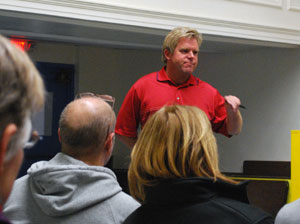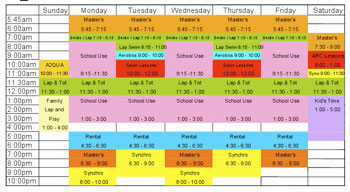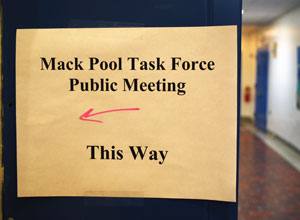More Options for Ann Arbor’s Mack Pool
Though the closing of Mack Pool was on a list of budget-cutting ideas during Ann Arbor city council’s Dec. 5 retreat, a task force continues to work on ways to save the pool, and held a public meeting on Thursday to give an update on its progress.
Colin Smith, the city’s parks and recreation manager, told a group of about 25 people that the task force is focused on bridging the roughly $100,000 gap between expenses and revenues for the pool – even though the group is well aware of the city’s larger budget crisis. That broader budget crisis includes the possibility of up to 30% cuts in the city’s general fund budget through fiscal 2012.
Smith noted that the task force had come up with nearly $36,000 in net savings and revenue – about a third of the way toward its goal so far. With just over two months before recommendations will be delivered to city council, “we’re not done,” he said.
Background: Targeted for Cuts
The closing of Mack Pool, located within the Ann Arbor Open school, was first floated as an option among budget cuts proposed by city administrator Roger Fraser at an April 2009 council working session. With revenues of $122,100 and expenses of $224,513 expected in fiscal 2010, the pool is being subsidized with $102,413 from the city’s general fund.
Fraser’s budget proposal, which was later adopted by city council, called for Mack Pool to be closed or turned over to the Ann Arbor Public Schools at the beginning of fiscal 2011, which begins on July 1, 2010. At Thursday’s public meeting, Jayne Miller – the city’s community services area administrator and Colin Smith’s boss – reminded the group that the recommendation to close Mack Pool is still in that budget plan.
But there’s still hope to save it from closing. Soon after news of the possible closing became public earlier this year, supporters of the pool – including a variety of groups who use it regularly, from Dawn Ducks to synchronized swimmers – mobilized to lobby for it to remain open. In August, city council appointed a 15-member task force to explore ways to eliminate the $100,000 funding gap. They held an initial public meeting in November, where about 50 people met to brainstorm ideas. [See Chronicle coverage: "Task Force Floats Ways to Save Mack Pool"]
The task force has formed three subcommittees, focusing on: 1) raising revenues, 2) cutting expenses, and 3) renegotiating an agreement between the city of Ann Arbor and the Ann Arbor Public Schools – an agreement that’s governed use of Mack Pool since 1974.
At Thursday’s meeting, Smith presented initial recommendations from the task force’s work.
Agreement with Ann Arbor Public Schools
The city is negotiating with the school in two key areas: Getting additional hours for public use during the school days, and modifying a cost-sharing plan.
Currently, the pool is closed to the public during school hours, except for a limited period from 11 a.m. to noon on weekdays. Smith reported that the new agreement will give the city an additional 14 hours per week of use during the weekdays. On Tuesdays and Thursdays, the pool will be available to the city from 8:15 a.m. until 1 p.m. Getting two large blocks of time is huge, Smith said, and will allow them to plan swim lessons, aerobics classes, and other programs, bringing in an estimated net revenue of about $7,000 annually.
In addition, on Mondays, Wednesdays and Fridays, the pool will be open to the public from 11:30 a.m. until 1 p.m. – hours that make it easier to market for swimmers coming on their lunch break, Smith said. They’ll continue to have “Tot Splash” program during this time as well, for kids under 7 years old. The city will also have access to the pool every weekday from 3-4 p.m.
Smith said that the plan is for the city and school system to revisit the agreement every year, and modify it to reflect levels of use on an ongoing basis.
A draft of the agreement is expected to be finished this week. Smith did not share information about cost-sharing changes with the schools, but said that it would reflect current economic realities as well as usage. Specific details of this agreement and the revenue it might generate will likely be available by the time the overall Mack Pool recommendations are made to the city’s park advisory commission at their Jan. 19 meeting.
Expenses: Energy, Staff, IT
Three areas were targeted for possible reductions to expenses: energy costs, staffing and information technology charges.
Energy costs
The task force and city staff explored four ways to curb energy costs: 1) installing LED lights, 2) getting a thermal blanket to cover the pool when not in use, 3) installing variable drive pumps, and 4) exploring alternatives to chlorine. All of these options would require capital investments, Smith said. Parks millage money or grants could cover the cost.
Installing LED lights in the pool area could save about $2,000 annually, Smith said. The city has applied for a grant to fund the installation of these lights, he said. City officials won’t learn whether the grant is awarded until the end of this year.

Colin Smith, the city's parks and recreation manager, gives an update on initial recommendations for raising revenue and cutting expenses at Mack Pool. The Dec. 10 meeting was held in the auditorium of Ann Arbor Open school.
A thermal blanket would save energy costs in two ways: by containing the heat in the water and cutting the city’s natural gas expenses, which are about $37,500 a year for Mack Pool, and by limiting water evaporation and saving on the school’s water bill. [In the current agreement between the city and schools, the city pays for natural gas and the schools pay for water.]
Dan McGuire, supervisor for Mack and Fuller pools, said he’d contacted other municipal and private pools in Michigan and nationwide, and found that very few use thermal blankets. It would cost about $56,000 to install one that was fully automated – that is, which didn’t require two people to remove it or put it down. Most people he talked to said storage would be difficult and that it would be too cumbersome to use on a daily basis. City staff will continue to explore this possibility, but Smith said it was a red flag that so few pools used the blankets.
McGuire also spoke about the option of installing variable frequency drive (VFD) pumps for the pool’s water pumping system. Because the state mandates the gallons-per-minute flow on the pool, it wouldn’t be possible to take advantage of reducing the flow with variable speed pumps, he said.
State regulations were also an issue on the question of de-chlorinating the pool and using a less expensive approach to keeping the pool free from bacteria. The state mandates a certain level of chlorine residuals in the pool, McGuire said, which means they couldn’t have a chlorine-free pool. Someone from the audience asked about saltwater pools, like the ones at the new health and fitness center at Washtenaw Community College. Because salt contains chlorine naturally, there are sufficient chlorine residuals to meet state standards, without the harsh chemical. Smith noted that it would require a significant investment to switch Mack Pool over to a saltwater system.
Staffing, IT
The task force is not recommending a reduction in staffing levels, Smith said, because of safety and customer service concerns. Generally there are three people on duty – one in the office, and two lifeguards.
There would be some savings in information technology, Smith said, by reducing the number of computers at the pool office and the number of software applications loaded onto those computers. It’s estimated that those changes would save roughly $4,000 annually, he said.
Revenues: Increase in Users, Fees
Smith highlighted five areas that have potential for raising revenues: Rental groups, fee increases, more programming, marketing and additional partnerships.
Rental groups
Groups that rent the pool on a regular basis supply a stable revenue stream that can be booked in advance. Swim teams, swim schools and home-schooling groups fall into that category. Smith said the possibility of offering lower rental fees for repeat renters, as an incentive, was being explored. Staff members estimate net revenue could be boosted by $8,500 annually from an increase in rental groups.
Raising fees
The task force is considering a 25% increase in fees for its season passes and master’s swimming sessions. Smith said that at the previous public meeting they’d gotten feedback that the pool’s fees were very generous. Even with the proposed increase, fees would be lower than many comparable municipalities, he said. Among the changes, the “drop-in” fee for master’s swimming sessions would increase from $5 to $6.25. A residential family pass would increase from $5.25 per week to $6.58. The city also has a scholarship fund for people who can’t afford to pay, Smith said.
Programming, partnerships
A new master’s class will likely be added on Saturday mornings, Smith said, starting in January. That’s estimated to bring in a net revenue increase of $2,080 annually.
In addition, the city is looking to partner with groups like small local gyms, Smith said. Those gyms could offer their members access to the pool as part of their membership package. The advantage would be that the gyms would “sell” the pool and bring in new users.
Swim schools are another category of partner that would provide a stable revenue source. Smith said his staff was talking with swim schools in Birmingham and Novi that might be interested in offering classes at Mack Pool.
Later in the meeting, Ed Sketch – a regular user of Mack Pool and a task force member – said he’d talked with a woman in Ann Arbor who gives swim lessons and has a waiting list. She’d be ready to book at least 30 hours a week at $50 an hour, he said. There’s also someone at the University of Michigan business school who’d be willing to write up a business plan for a swim school, he said. “I think we have the talent here in town.”
Marketing
In the next few weeks, the city will be conducting an email survey to gauge interest in activities related to Mack Pool, Smith said. The survey will also include questions aimed at identifying how much people would be willing to pay for access to the pool.
The task force is recommending more marketing in general, including better signs to mark the location of the pool.
Summary, and More Discussion
Smith said that his staff was being conservative in their estimates, which he later clarified as “realistic.” He summarized the total savings of $35,955 from these sources:
- Fee increases (revenues) = $8,375
- Rentals (revenues) = $8,500
- Additional programming (revenues) = $2,080
- Increased hours from school (revenues) = $7,000
- IT savings (expense cuts) = $4,000
- Energy savings (expense cuts) = $6,000
The plan is to present recommendations to the park advisory commission on Jan. 19, Smith said, and hopefully find additional expense cuts or revenue increases before then. PAC will make a recommendation to city council in February. Council is expected to take action on the budget in May.
Jayne Miller, the city’s community services area administrator, reminded the group that the closing of Mack Pool was still in the budget for fiscal 2011 – that recommendation occurred even before the more recent expense-cutting goals were announced, she said. Carsten Hohnke, the councilmember who represents Ward 5, where Mack Pool is located, said the best way to feel secure about keeping Mack Pool open is to make sure it doesn’t require a general fund subsidy.
Ed Sketch, who’s on the task force, agreed that having a subsidy causes instability for the pool. He also noted the dilemma of being either overly conservative or overly optimistic in estimating what can be done, particularly in terms of new revenue, and he cautioned against what he feels are revenue estimates that are too conservative. Miller characterized the estimates as realistic, not conservative – and Smith agreed. They said they’d revise the estimates as they get additional information.
One woman attending Thursday’s forum said she’d been heartened by the recent PBS Newshour segment on Ann Arbor, in which mayor John Hieftje was interviewed talking about the importance of having amenities in the town, attracting researchers to move here and building the tax base. “There’s another way to think about this,” she said, adding that if there’s a mindset of just making cuts, officials could be hurting the city’s future.
A woman involved with the Aquarians Synchronized Swim Team, which trains at the pool, objected to the new time that the group is tentatively allotted for practice – 8-10 p.m. on Mondays and Wednesdays, and 6:30-9 p.m. Tuesdays and Thursdays. The hour was too late for teens who had to get up early for school, she said, and the group might have to find another pool for practice if they couldn’t get an earlier evening slot.
Smith acknowledged that it was difficult to accommodate all groups, and that some would have to move from their current slots. Here’s a tentative new schedule for the week, reflecting additional times provided during the school day:

This shows how different user groups might be scheduled to use Mack Pool. (Image links to larger file.)
Another person asked how Mack Pool compared to the city’s other swimming facilities. Smith said that there’d be no savings to close Fuller Pool, and that Buhr Park and Veterans Park pools are subsidized less than Mack. Far more people use the other pools, Smith said. Buhr Pool, for example, gets the same number of visits during the three summer months that it’s open as Mack does for the rest of the year. (Mack, an indoor pool, is closed during the summer.)
A question was raised about donations: What if someone wanted to give money to the pool – was that possible? Smith said that sponsorships was a suggestion discussed by the Ann Arbor Senior Center task force, which is going through a similar process. [See previous Chronicle coverage: "Seniors Weigh In on Fate of Center"] Perhaps it was something they could consider for Mack, too, Smith said.
Ed Sketch described the situation thus far as having all the ingredients for a great cake, but not yet the right recipe. Strategically, he said, the best approach might be a hybrid of a community pool, with a diverse group of users, and a swim school, which could bring in a lot of revenue.

Shakespeare is one of four historical figures featured in the ornate cornice of the Ann Arbor Open auditorium, where Thursday's Mack Pool task force meeting was held. (Bonus points for readers who can name the other three.) And finally, a quote from the Bard: "The people are like water and the ruler a boat. Water can support a boat or overturn it."





I find it disconcerting how city departments can find things to cut from the budget when the pinch is on. Where were these efforts when the city was “flush”?
Are the Mack pool (Fuller and Buhr as well) solar systems installed some 10 or more years ago still working and in use?
It’s wonderful that people are making the effort to save Mack Pool. It is a gem.
In the new schedule, swim times for families are limited to lap and tot, and weekend family swim. I like to swim laps and my children are a bit too old to just play in the tot area.
There may be a segment of people like me who use the pool, but not as often as they’d like, because “family swim” times are too infrequent.
Please also think about homeschooling families in Ann Arbor. There are many! And many of these families have flexibility in scheduling. You can market directly to them.
Finally, although Mack is closed in the summer, I often wish it was open, as I want a cool place to swim out of the sun.
I’d love to see a general swim time in the after school slot, 3-4 PM, M-F…many parents of Open kids would stay and use the pool if it were available for general swim at that time. The old schedule did not open the pool for older kids and parents until the evening…too much of a hassle to get back down there and too late for school nights. Being able to swim immediately after school and before dinner would be fabulous. Unlike most elementary/middle schools, Open has a good hundred or more families that actually pick up their kids, in person,at that time, 3 PM. Let’s take advantage of the fact that people are already there at the building!
The problem with Mack is the pool is too cold!
I thought Mack was kept a bit warmer for the Dawn Ducks but too warm for lap swimming. It’s the air that’s cold in the winter(big windows with radiant heat loss and very little heat in the locker rooms).